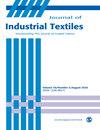Optimization and experimental validation of reinforcing fibers winding pattern for carbon/carbon composite crucible preform
IF 2
4区 工程技术
Q1 MATERIALS SCIENCE, TEXTILES
引用次数: 0
Abstract
In order to address the problem of transition slip between the cylindrical segment and the ellipsoidal head segment of the carbon/carbon composite crucible preform with asymmetrical structure during the winding process, a winding pattern combining geodesic and non-geodesic is presented innovatively. Firstly, the formulae for the winding angle and the winding central rotation angle of the crucible cylindrical segment and the ellipsoidal head segment are established, and the fourth-order Runge-Kutta numerical method is employed for parametrical design. The two-tangent point winding path is determined by analyzing the effect of the cylindrical segment’s winding pitch, different ellipsoidal head segment heights, and slip coefficient on the winding angle. Secondly, the needle disk winding method is proposed to address the slight winding angle at the open end of the cylinder, making it easier to hang the yarn. Finally, the experiment on dry yarn winding of 3k carbon fiber (linear density: 198 g/km) is carried out. The results indicate that the relative error rate between the actual winding angle and the theoretical design angle differs by no more than 1.66%, demonstrating that carbon fibers can be stably and uniformly wound onto the surface of the carbon/carbon composite crucible preform. Compared to the traditional manual winding method, the winding pattern enhances winding efficiency, ensures carbon fibers’ uniformity and structural stability, and provides a new technological approach to producing high-performance composite materials.碳/碳复合材料坩埚瓶坯增强纤维缠绕模式的优化与实验验证
针对非对称结构碳/碳复合材料坩埚预型件在缠绕过程中圆柱段和椭圆头段之间的过渡滑移问题,创新性地提出了一种大地线与非大地线相结合的缠绕模式。首先,建立了坩埚圆柱段和椭圆头段的缠绕角和缠绕中心旋转角公式,并采用四阶 Runge-Kutta 数值方法进行参数设计。通过分析圆柱段缠绕节距、不同椭圆头段高度和滑移系数对缠绕角的影响,确定了两切点缠绕路径。其次,针对筒子开口端卷绕角度较小的问题,提出了针盘卷绕法,便于挂纱。最后,对 3k 碳纤维(线密度:198 g/km)进行了干纱卷绕实验。结果表明,实际卷绕角度与理论设计角度之间的相对误差率不超过 1.66%,表明碳纤维可以稳定、均匀地卷绕到碳/碳复合材料坩埚预型件的表面。与传统的手工缠绕方法相比,该缠绕模式提高了缠绕效率,确保了碳纤维的均匀性和结构稳定性,为生产高性能复合材料提供了新的技术途径。
本文章由计算机程序翻译,如有差异,请以英文原文为准。
求助全文
约1分钟内获得全文
求助全文
来源期刊

Journal of Industrial Textiles
MATERIALS SCIENCE, TEXTILES-
CiteScore
5.30
自引率
18.80%
发文量
165
审稿时长
2.3 months
期刊介绍:
The Journal of Industrial Textiles is the only peer reviewed journal devoted exclusively to technology, processing, methodology, modelling and applications in technical textiles, nonwovens, coated and laminated fabrics, textile composites and nanofibers.
 求助内容:
求助内容: 应助结果提醒方式:
应助结果提醒方式:


